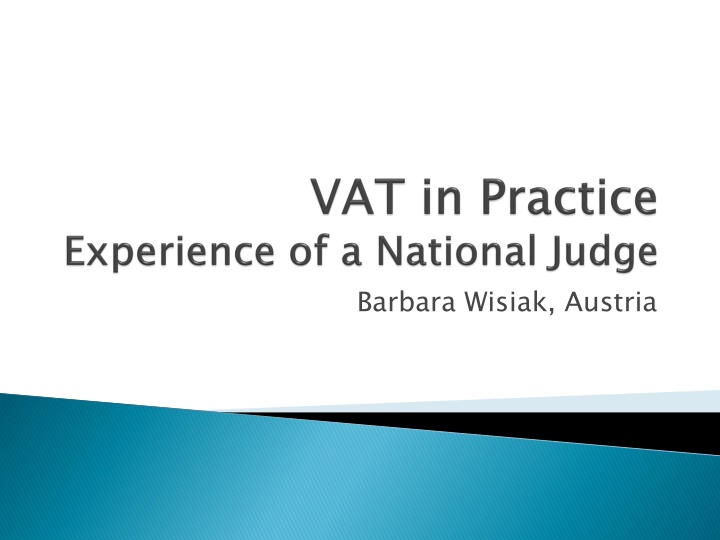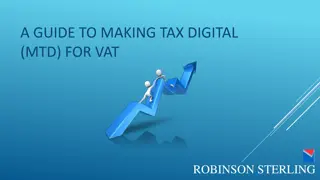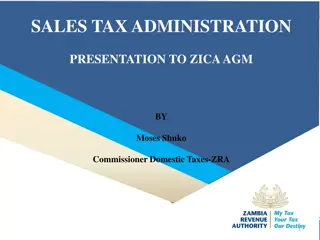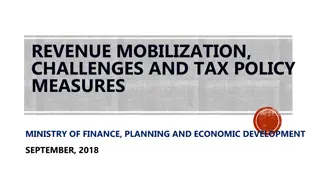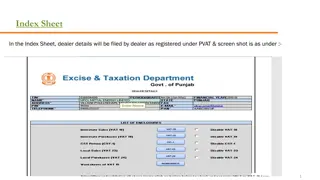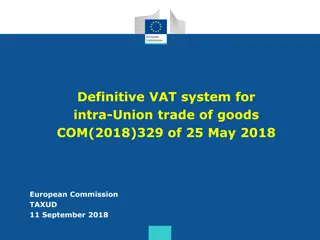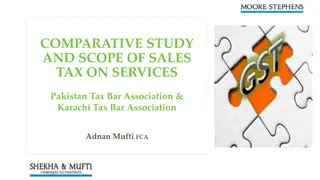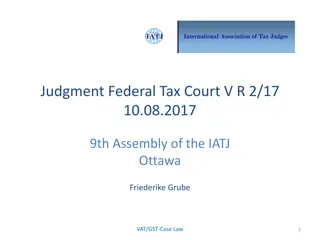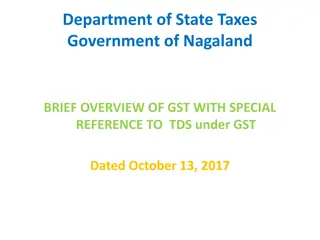Overview of VAT Directives and National Tax Laws
This content delves into VAT Directives and national tax laws, highlighting the obligations of member states and the rights of taxpayers. It discusses the application of Directives in courts, the importance of clarity and precision in tax laws, and specific cases where Directives have been relied upon. The information covers exemptions, small enterprises, and changes in national laws.
Download Presentation

Please find below an Image/Link to download the presentation.
The content on the website is provided AS IS for your information and personal use only. It may not be sold, licensed, or shared on other websites without obtaining consent from the author.If you encounter any issues during the download, it is possible that the publisher has removed the file from their server.
You are allowed to download the files provided on this website for personal or commercial use, subject to the condition that they are used lawfully. All files are the property of their respective owners.
The content on the website is provided AS IS for your information and personal use only. It may not be sold, licensed, or shared on other websites without obtaining consent from the author.
E N D
Presentation Transcript
VAT-Directive Memberstates: obligation to adopt national law form of adoption in general up to the Memberstate but see ECJ C-33/03 paragraph 25 administrative practice is not sufficient =judges apply national (tax) law jurisdiction of the ECJ Directive also relevant for application of national tax law
Memberstate may not claim against the taxpayer that it had failed to implement the Directive as the provisions of the Directive are unconditional and sufficiently precise, they may be relied on by individuals as against any national provision which is incompatible with the Directive see ECJ 19.01.1982, case 8/81, Becker or ECJ 27.06.1989, case 50/88, K hne
national law in favour of the taxpayer: apply national law (Directive not applied against taxable persons) but reason for an infringement proceeding exception: principle that abusive practices are prohibited (Halifax) may be relied on against a taxable person ECJ 22.11.2017, case C-251/16 Cussens ! Directive in favour of taxpayer: Directive directly relied on
very rarely ECJ 19.1.1982, C-8/81, Becker: Germany did not tax exempt negotiation of credit but the Directive did ->may directly be relied upon ECJ 27.6.1989, C-50/88, K hne: in Germany taxation of the private use of business goods was independent of deduction of input-VAT Directive: taxation only if input-VAT was not wholly or partly deductible -> Directive may be relied on by a taxable person before the courts of a Member State in so far as that provision precludes.
ECJ 18.1.2001, Case C-150/99, Stockholm Lind park AB : VAT-Directive precludes general tax exemption for supplies concerning the practice of sport VAT-Directive is sufficiently clear, precise and unconditional = may be taxed and input-VAT deducted Austrian Tax Court 14.2.2018, RV/5101435/2014 Tax exemption for small enterprises VAT Directive: Taxable person established in Memberstate national law: taxable person lives in Austria ! Austria changed law in the meantime
Supreme Administrative Court of Austria, 27.9.2017, Ra 2015/15/0045 Cherry picking taxable person applied VAT-directive for deduction of input-VAT and national law (not taxable) for taxation not possible: taxation as a whole either according to national law or to VAT-Directive
ECJ 8.10.1987, Case 80/87, Kolpinghuis Nijmegen In applying its national legislation, a court of a Member State is required to interpret that legislation in the light of the wording and the purpose of the Directive Preliminary ruling under Article 267 TFEU help to understand the VAT-Directive
ECJ answers only the question ECJ 24.10.1996, Case C-317/94 Elida Gibbs the taxable amount is the price less the amount indicated on the coupon even if it is refunded to a wholesaler rather than directly to a retailer. what about deduction of input-VAT? see also ECJ 20.12.2017, C-462/16 Boehringer Ingelheim Pharma
ECJ doesn`t tell how: ECJ 16.12.2010, case C-21/16 Euro Tyre (to chain transactions): the transport shall be ascribed to a supply by an overall assessment of all circumstances considering if the right to dispose of the goods as owner has been transferred before or after the intra- Community transport up to the referring court to establish whether that condition has been fulfilled
ECJ doesn`t tell how: ECJ 13.3.2008, case C-437/06, Securenta: how should the apportionment of the input tax between business activity and private activity be carried out? Memberstate must provide for a method of calculation which objectively reflects the part of the input expenditure actually to be attributed with regard to the aims and broad logic of that directive
in nearly every VAT-case ECJ-jurisdiction can be relevant national view might change Supreme Administrative Court of Austria 29.3.2007, 2004/15/0017: selling the goodwill of a company is a supply of goods ECJ 22.10.2009, case C-242/08 Swiss RE : supply of services Tax Court 28.2.2014, RV/2100756/2012: supply of services
border between interpretation and sense of the words ECJ 15.4.2008, Case C-208/06, Impact paragraph 100: interpretation limited by general principles of law as of legal certainty and non-retroactivity and not contra not contra legem legem
Supreme Administrative Court of Austria 13.9.2017, Ro 2017/13/0015 Art 132 c VAT-Directive: the provision of medical care in the exercise of the medical professions national law: (all) supplies of medical professions Question: plastic surgeon No interpretation against sense of the words
interpretation in the light of the directive became routine no interpretation contra (national) legem difficulties because ECJ only answers referred questions (but solving the case) ECJ often leaves interpretation to the national court rarely the directive is directly relayed on access to ECJ-judgements is granted but not to what happens in the Memberstates
